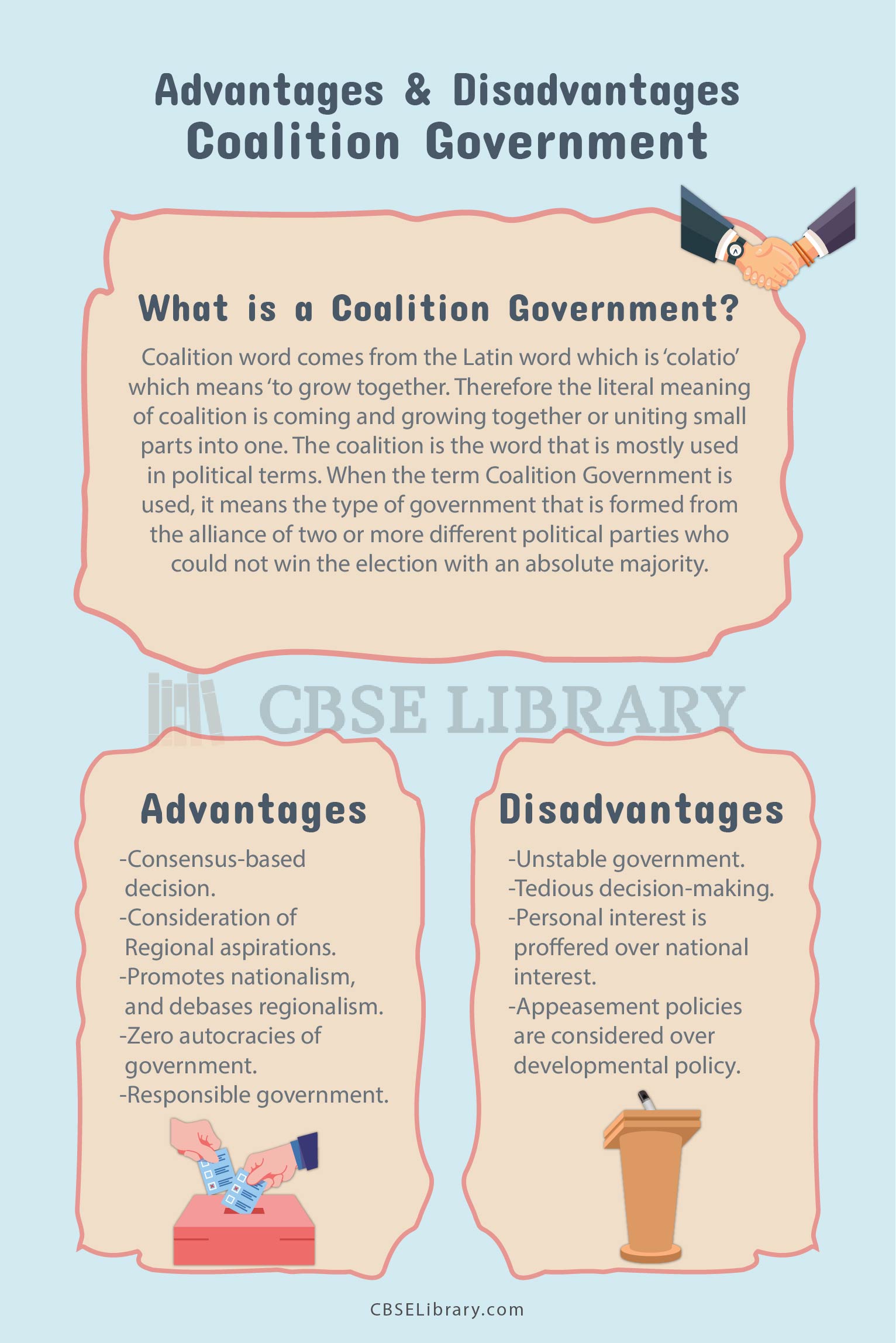Coalition Government Advantages And Disadvantages: Coalition Government is a type of government where different political parties ally. This happens when no specific political party has won the elections with the majority. In an election, when no specific party is winning with the absolute majority, then two or more parties cooperate to form a government. This can also be called as actually a board of advisors, who confederate too form to form the laws, supervise the system, and run the country or a state. The stability of a Coalition Government is always in question, as the single party with the full majority is more stable and reliable.
Students can also find more Advantages and Disadvantages articles on events, persons, sports, technology, and many more.
What is a Coalition Government? What are the Advantages and Disadvantages of Coalition Government?
Coalition word comes from the Latin word which is ‘colatio’ which means ‘to grow together. Therefore the literal meaning of coalition is coming and growing together or uniting small parts into one. The coalition is the word that is mostly used in political terms. When the term Coalition Government is used, it means the type of government that is formed from the alliance of two or more different political parties who could not win the election with an absolute majority. All the parties that are going to be involved in the coalition need to have enough members, who agree on a draft program. This draft program does not need to have too much of nasty and difficult compromises with the policies of each of the parties. Once the agreement is done, a Coalition Government can be formed. Apart from this situation, a Coalition Government can also be formed during an emergency or any crisis condition in the country.
- Advantages of Coalition Government
- Disadvantages of Coalition Government
- Comparison Table for Advantages and Disadvantages of Coalition Government
- FAQ’s on Coalition Government Advantages And Disadvantages
Features of a Coalition Government
A very famous author and academician, Prof. J.C. Johari, has summarized the features of a Coalition Government in the following ways. Let’s have a look.
- Coalitions are formed for the sake of some reward, material or psychic.
- A coalition implies the existence of at least two partners.
- The underlying principle of a coalition system stands on the simple fact of temporary conjunction of specific interests.
- Coalition politics is not a static but a dynamic affair as coalition players and groups dissolve and form new ones.
- The keynote of coalition politics is compromising, and rigid dogma has no place in it.
- A Coalition Government works based on a minimum program, which may not be ideal for each partner of the coalition.
- Pragmatism and not ideology is the hallmark of coalition politics. In making political adjustments, principles may have to be set aside.
- The purpose of a coalition adjustment is to seize power.
In Indian politics, the formation of a Coalition Government can be seen most exact before or after the elections, but the formation of a Coalition Government before the elections is more beneficial. This is because the pre-election coalition polarizes the voters according to their choices. Also, it allows the candidates of parties to chase and impress the voters through the manifesto designed by them. Whereas, the coalition after the election results is just an alliance of the parties who come up together and regulate the law and order in the country.
Advantages of Coalition Government
Following are the advantage of forming a Coalition Government-
- Diversified interests: When different parties with different ideologies work together, they bring in their area of interest of working, which may differ from the other’s manifesto. Hence public gets the benefits of diversified interests.
- Cuts down the tussle between parties: At the time of the formation of a Coalition Government, parties unite on some compromises. This brings stability to the government and reduces the grievances of different parties with each other.
- A higher number of representatives: India, being a vast country, with an immense variety of cultures, traditions, and languages, the Coalition Government is a plus point. Because of the variety of representatives, the viewpoint and popular opinion of the electorate can be presented before the government.
- Consensus-based Politics: Since the Coalition Government is formed with two or multiple parties having diverged ideologies and agendas, it is important to have a synchroneity among the leaders to run the government and regulate the country (or state). Hence, it is a Consensus-based Politics.
- Strengthens the federal system: India follows the federal system of governance. In such a country, having multiple parties at the top to run a country or state boundary, is a good idea, as the representative and government will be more sensitive to the regional demands.
- Reduce dictatorship: Forming the government in a coalition helps to reduce the dictatorship of a single government to a wide range. In a Coalition Government, all the members of the cabinet are involved in the decision-making process.
Disadvantages of Coalition Government
Following are the disadvantage of forming a Coalition Government-
- Unstable: The formation and working style of a Coalition Government isn’t as easy as it looks. There are higher chances of instability in a Coalition Government. This is because there can be differences in the opinion of the member of parties. Such disagreements, if prolonged for a long time can lead to the demolition of government too.
- Problems at higher levels: The higher-level positions like the Prime Ministership, work on the principle of parliamentary form. When the government formed is through a coalition, then the prime minister needs to deliberate with the coalition party members. As the sole decision taken by the concerned PM may raise the dispute within the government.
- Separate decision-makers: In a Coalition Government, the main decision-maker is the steering committee. A steering committee is an association of high-level advisors, who have been appointed to manage the government and provide them the directions. This committee sabotages the role and functioning of the government system.
- Acquisitiveness to Power: The smaller constituents that come up together and form the government, may demand a higher authoritative power in the parliament after a certain period.
- Discretion of Members: Since the coalition, members may belong to different localities, and cultures, following different ideologies, and India is a secular country. Therefore the government has to take care of the interest of all the citizens. In such a situation, the regional leader may pressurize the government to act according to their need and requirements, else they can threaten the government to withdraw the government too.
- Blame games: No one party in a Coalition Government holds the accountability for any type of failure or the problem that happens during the ruling period or later. These parties start to play the blame games, do not bear any responsibility, and later go out of their way.

Comparison Table for Advantages and Disadvantages of Coalition Government
| Advantages | Disadvantages |
| Consensus-based decision. | Unstable government. |
| Consideration of Regional aspirations. | Tedious decision-making. |
| Promotes nationalism, and debases regionalism. | Personal interest is proffered over national interest. |
| Zero autocracies of government. | Appeasement policies are considered over developmental policy. |
| Responsible government |
FAQ’s on Coalition Government Advantages And Disadvantages
Question 1.
What is the maximum number of parties in a Coalition Government?
Answer:
Minimum Two parties are a must requirement for forming a Coalition Government. Maximum, although has no limit, a coalition of too many parties won’t give the best outcome as a government.
Question 2.
What is the condition for a Coalition Government to be formed?
Answer:
A Coalition Government is formed when no single party has won the full or absolute majority in the election. It can be at the state or a central level both.
Question 3.
What are the drawbacks of a Coalition Government?
Answer:
The major drawback of a Coalition Government is that it is weak at its base and also it is more region oriented rather than being nation oriented. This type of party cannot perform solely in the favor of the country.
Question 4.
How does the sharing of power works in a Coalition Government?
Answer:
The power-sharing process in a Coalition Government is shared between all the members and parties of the coalition and the decision are taken mutually with the agreement of each and every member.
